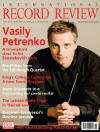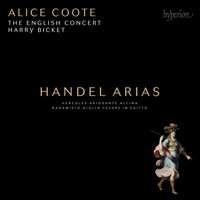Texte paru dans: / Appeared in: |
|
|
Reviewer: Hugh
Canning Handel aria recitals proliferate as never before, so a new entrant to the field ‑ it's surprising that Alice Coote hasn't recorded one before now ‑ has to offer something special. There is no doubt that Coote has an exceptional instrument for Handel, one that follows in the 'Royal' footsteps of such great British Handelians as Kathleen Ferrier, Janet Baker, Maureen Lehane and Sarah Connolly (I should also include Ann Murray, British by adoption and domicile, if nothing else, whose Forlane recital with the Orchestra of the Age of Enlightenment and Charles Mackerras includes five of the arias ‑ three from Ariodante, two from Alcina ‑ that Coote programmes here). Like Murray, Coote focuses entirely on roles she has sung on stage: Zenobia in Radamisto (Opera North), Ruggiero in Alcina (Stuttgart), Dejamra in Hercules (Lyric Opera of Chicago), Sesto in Giulio Cesare (Paris Opera) and Ariodante (Aix‑en‑Provence). This is an entirely laudable approach at a time when many singers learn unfamiliar ‑sometimes unsuitable ‑ material for solo albums. it is notable that nothing from Orlando ‑ the role of her Royal Opera debut and one she hasn't repeated ‑ is to be found here. Handel's Senesino roles probably lie too low for her, although she could probably manage the title role of Radamisto in the earlier version sung by Margherita Durastanti when the castrato failed to turn up in time for the first run of Royal Academy of Music performances: here she sings the exquisite ‑and disappointingly short ‑ lament 'Quando mai, spietata sorte' ('When, cruel fate?') allotted to Zenobia, the role Durastanti assumed when Senesino eventually arrived. At my first listening to this programme, my enjoyment of Coote's lush, Bakeresque mezzo in this music was seriously marred only by the plodding tempo ‑ her choice, I presume ‑ for Ariodante's despairing and angry 'Scherza infida' ('Play around, unfaithful woman in the arms of your lover'). Baker's account from the complete recording of the opera conducted by Raymond Leppard (Philips, now Decca ‑ the aria has been excerpted as a bonus to Baker's famous Handel recital album, same conductor and label/s) is some four minutes shorter and her singing is full of rage. Coote, by contrast, sounds self‑pitying, maudlin and mannered. The aria doesn't quite grind to a standstill ‑ as it does in Anne‑Sofie von Otter's even slower version conducted by Minkowski on their complete Archiv set ‑but it's a close thing. I'm not sure I would want to listen to either version frequently ‑both seem to take Handel back to the era of Ferrier and the plodding conductors of the German Handel revival. A second hearing of this new disc, I'm afraid, only increased my reservations. In her selection, Coote greatly prefers plangent, sorrowing Handel characters to his bravura heroes and furious heroines. The exceptions here are Ruggiero's hunting‑horn‑accompanied (imaginary) pursuit of the ‑Ircanian Tiger, ‘Sta nell'Ircana', Dejanira's mad scene, 'Where shall I fly? ... See' the dreadful sisters rise', from Hercules, and two of Ariodante's virtuoso numbers, 'Con Fali di constanza' ('With wings of constancy') and 'Dopo notte' ('After dark and gloomy night'). Coote can't match Baker's delicacy and charm in the first, nor her dazzling coloratura in the second. (Baker's recital version is more thrilling and faster than the later one on the complete recording.) Even so, Coote dispatches the fast arias well, but I find her less compelling in arias such as Ruggiero's sublime 'Mi lusinga il dolce affetto' ('My tender affection is beguiled), Dejanira's 'Cease, ruler of the day, to rise' (try Sarah Walker on John Eliot Gardiner's (not quite complete) Archiv recording to hear what I mean) and Sesto's 'Cara speme' ('Cherished hope') from Giulio Cesare. Her expressive effects are not as extreme as in 'Scherza infida', but they made me feel that both she and her conductor Harry Bicket are making an emotional ninecourse banquet of these numbers. A simpler, more direct, less 'interventionist' and 'spotlit' approach would be more touching ‑ and is on many other recordings. Coote's multitude of fans won't be put off by my strictures ‑ although they might expect less routine playing from The English Concert ‑ and it's always a pleasure to hear such a beautiful voice in prime condition. I'll return to the disc for her 'Dopo notte' and the tantalizing excerpt from Radamisto ‑ one of Handel's most under‑appreciated and underrecorded masterpieces for the stage. |
|
|
|
|
|
Cliquez l'un ou l'autre
bouton pour découvrir bien d'autres critiques de CD |
|




